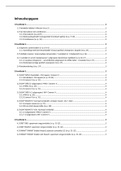Summary
Samenvatting Stap voor stap Handelingen Spss 17/20
- Course
- Institution
- Book
duidelijk docu met de letterlijke stappen neergeschreven. 17/20 Door dit plan te volgen. Je moet enkel weten wat voor soort vraag het is en welke soort variabelen gebruikt worden.
[Show more]




